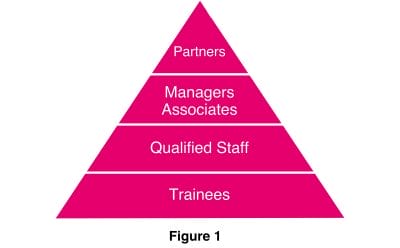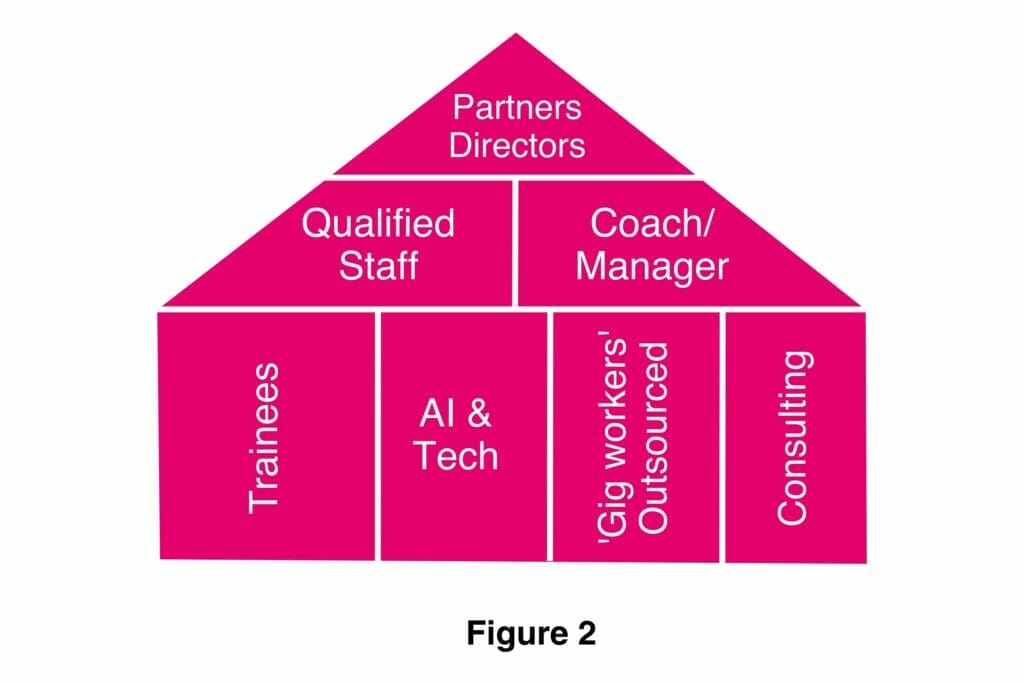What the future holds – shouldn’t you be thinking of leaving?
Blog 2 of 2:
By Paul Richmond, Managing Director.
In our first blog of two here, we looked at recruiting and retaining talent, starting with refocusing your website so that it benefits those exploring what it would be like to work with you. We also discussed how to maximise your employee value proposition by looking at different elements that employers provide for their employees.
In this second blog, we consider the impact of the transition we’re seeing in employees, a little bit like a futurist might do. Let’s map out some of the things that are slowly beginning to dawn on the profession in 2023 and beyond:
How do we recruit?
Diversity and inclusion initiatives have gained momentum, and people now understand there’s a mountain to climb if you want to employ diverse talent. If you’re not relying on that “2:1 from a good university,” how will you be able to profile candidates? Suddenly, what they can actually do face-to-face with another individual or as part of a team is more important than academic ability.
How could you possibly know that before you employ them?
We may see a return to group interviews with practical tasks being set.
“I don’t have a line of sight”
Managing people has always been a challenge, because, unlike the law, there are no rules, no two people are exactly the same, and therefore they respond differently to the same situation. It means you need to be very adaptable in order to manage a group of people and get them travelling in the same direction. A few years ago, it was possible to just “keep an eye on people” as they were in the office, but now that’s not so simple because people work remotely and may not even be in the office when you choose to come in, so you never have a clear line of sight. It makes the manager’s role critical in terms of performance management, support, encouragement, and providing that sense of unity across the team to the individuals reporting to them.
Your managers must represent ALL the values of the organisation
“When everybody was in the office, people had a sense of ‘what’s the culture’ around here.”
In 2023, it’s quite possible that the only reflection of culture for many junior employees is the way they are treated by their managers. For that employee, the manager represents all the firm’s values, culture and rituals, the support and sense of team that they will ever see. Because they don’t come into the office, they never meet other managers, and they don’t have a line of sight through to those more senior than their own boss.
How confident are you that ALL our managers and directors reflect the values of the firm as you would wish? If not, then how are you compensating by wrapping your arms around their staff?
Do you think it’s tough now? Welcome to The Brave New World
Everyone has noticed the shift away from office-based work, but at the moment, I’m sure many of you reading this are still confident that you fully understand what’s on everyone’s mind, because after all, you were in their position once upon a time, weren’t you?
I would not be so sure, because the traditional model of the practice is changing.
In figure 1 below, you can see the shape of the firm that you trained in. A large intake of junior staff, where perhaps 50% leave on qualification, and then more leave as the rigours of management determine who will stay the course, and then the favoured few become partners.
Figure 2 is a glimpse into our likely future. Fewer junior staff because we have AI and technology to help us, and more consultants who are not following an accountancy or legal pathway because we will not need as many of those people.
 |
 |
| Figure 1: Traditional firm | Figure 2: Future firm |
You need to provide clients with insights from their own software reporting systems.
And so, we see a very different shape and that brings a different culture. People joining from many different walks of life, there will be a relative tsunami of gig workers, part-timers and probably people returning from retirement to join the firm. Have you spoken to your alumni lately?
Only last week I was talking to a managing partner in a very successful UK regional practice. He mentioned one of his latest recruits who was smart, very good with people, meticulous, a planner, this new joiner had, in fact, been a GP for over a decade!
When you have such an approachable manner, where someone is clearly so good with people, I wonder if we really should be tying them down with timesheets and measuring their success in one utilisation number? What would you do?
Gen Z recruits don’t have the social skills…
I’ve got some bad news here, and I will lift a very poignant paragraph from Gartner’s HR toolkit – Tackling 2023 future of work problems:
“Organisations need to recognise that everyone’s social skills have been eroded since the beginning of the pandemic, not just Gen Z.”
Burnout, exhaustion and career insecurity, all fuelled during the pandemic have eroded performance. No one, from any generation, has cracked the code for navigating a new shared professional environment. Focusing exclusively on Gen Z will not adequately address this challenge, organisations must redefine professionalism for their entire workforce.”
The fact is that managers’ expectations regarding the behavioural skills of new hires do not align with the experiences these individuals have had available to them. More than 51% of new hires report that their education has not adequately prepared them for entering the workforce.
So the question is, what are we going to do about it?
Probably the most frightening issue is that, during the annual offsite, when most SLT members enjoy a glass of wine, catch up with each other, and discuss some of the challenges while putting together aspirational numbers for the next few years, very few actually consider the fundamental changes that are occurring around them:
- Recruitment will never be the same again.
- Unless every single manager can exhibit and follow your values, they mean nothing.
- The office environment you grew up in, will never come back.
- You will need more staff to satisfy your growth aspirations and yet traditional recruitment will not provide enough of them.
- While it is interesting to discuss AI and understand that even though you have discovered Chat GPT, other people are using it to drive their business and they are going to eat your lunch!
- Firms may need to open up to behaving more like multi-disciplinary businesses than ‘an accounting/law firm’.
With the advent of AI and the increasing reliance on computers to handle high-volume, low-value work, many firms are finding that their old structures just do not facilitate effective working. The required skill sets are changing, and People are noticing that the interpersonal skills that were drilled into trainees 20 or 30 years ago are lacking.
Conversations with each other happen on Teams, Email, Slack, and a conversation with a client is a rarity. Moreover, the management of staff needs to change. As more people are recruited into specialist roles, full-time managers are needed to ensure they receive adequate support. This spills over into the way we manage trainees and qualified staff, with some firms creating coach/manager roles.
How well will your firm be able to adapt to a different structure, not only in terms of reporting but also regarding remuneration and people management, to accommodate the demands that clients are placing on the firm?
With all of these challenges in mind, you now need to make sure that you account for them in your strategic plan.
Got it covered?
If you would like to demonstrate how well-prepared you are, why not drop us a line and let us objectively review your plan (it’s free, after all) and identify any gaps that we see?
Your strategy should be kept simple, and we will assess where you are, and where you’re going, and ensure you have addressed the four key elements to fill any gaps: Operations, Finance, People and Clients.
Simple? So go on, show us what you’re made of. Get in touch and tell us here.